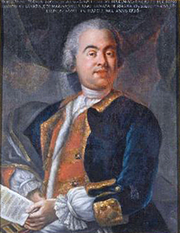
Riccardo Broschi
Encyclopedia

Composer
A composer is a person who creates music, either by musical notation or oral tradition, for interpretation and performance, or through direct manipulation of sonic material through electronic media...
of baroque music
Baroque music
Baroque music describes a style of Western Classical music approximately extending from 1600 to 1760. This era follows the Renaissance and was followed in turn by the Classical era...
and the brother of the opera singer Carlo Broschi, known as Farinelli
Farinelli
Farinelli , was the stage name of Carlo Maria Broschi, celebrated Italian castrato singer of the 18th century and one of the greatest singers in the history of opera.- Early years :...
.
Broschi was born in Naples, the son of Salvatore Broschi, a composer and chapelmaster of the Cathedral of the Puglinese citizens, and Caterina Berrese (according to the Book of Baptisms of the Church of S. Nicola, today near the Episcopal Archives).
The Broschi family, moved to Naples
Naples
Naples is a city in Southern Italy, situated on the country's west coast by the Gulf of Naples. Lying between two notable volcanic regions, Mount Vesuvius and the Phlegraean Fields, it is the capital of the region of Campania and of the province of Naples...
at the end of 1711, and enrolled Riccardo, firstborn, in the Conservatory of S. Maria di Loreto, where he would study to become a composer under G. Perugino and F. Mancinipresso. Salvatore, meanwhile, died unexpectedly , at 36, on 4 November of 1717. Caterina subsequently made Riccardo head of the family.
He made his debut in 1725 with La Vecchia Sorda. Next, he moved to London
London
London is the capital city of :England and the :United Kingdom, the largest metropolitan area in the United Kingdom, and the largest urban zone in the European Union by most measures. Located on the River Thames, London has been a major settlement for two millennia, its history going back to its...
in 1726 and stayed there until 1734 and wrote 6 heroic operas, his most successful being Artaserse. In 1737 he moved to Stuttgart
Stuttgart
Stuttgart is the capital of the state of Baden-Württemberg in southern Germany. The sixth-largest city in Germany, Stuttgart has a population of 600,038 while the metropolitan area has a population of 5.3 million ....
and briefly served at the Stuttgart court (1736-7) for the Duke Carl Alexander of Wurttemberg, then returned to Naples before joining his brother in Madrid
Madrid
Madrid is the capital and largest city of Spain. The population of the city is roughly 3.3 million and the entire population of the Madrid metropolitan area is calculated to be 6.271 million. It is the third largest city in the European Union, after London and Berlin, and its metropolitan...
in 1739. He died in Madrid.
Selected works
- La Vecchia Sorda (Naples 1725)
- L’Isola Di Alcina (Rome. 1728)
- Idaspe (Venice, 1730)
- Arianny e Teseo (Milan, 1731)
- Merope (Turin, 1732)
- Artaserse (London, 1734 - in collaboration with Johann Adolf Hasse)
- Nerone (Rome, 1735)
- Adriano in Siria (Milan, 1735)

